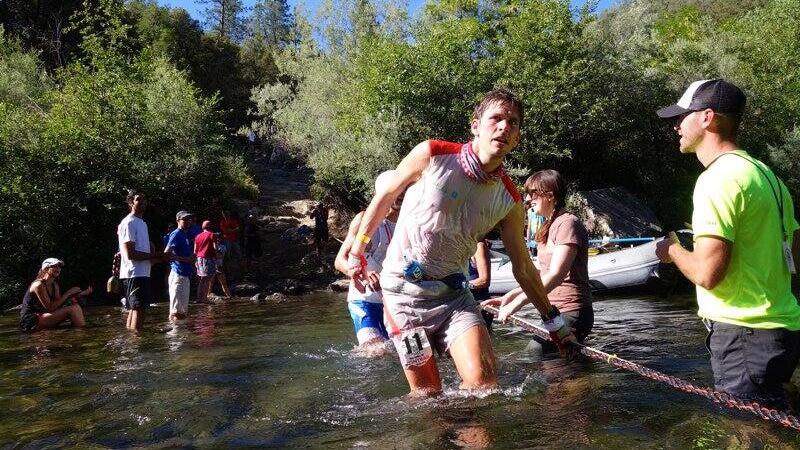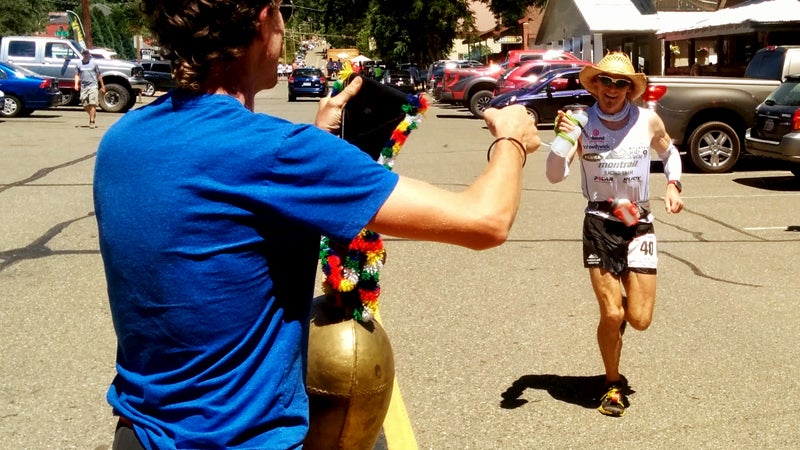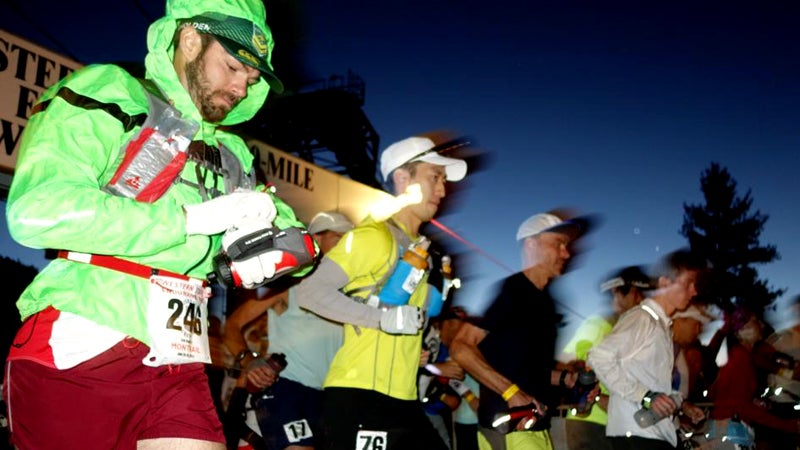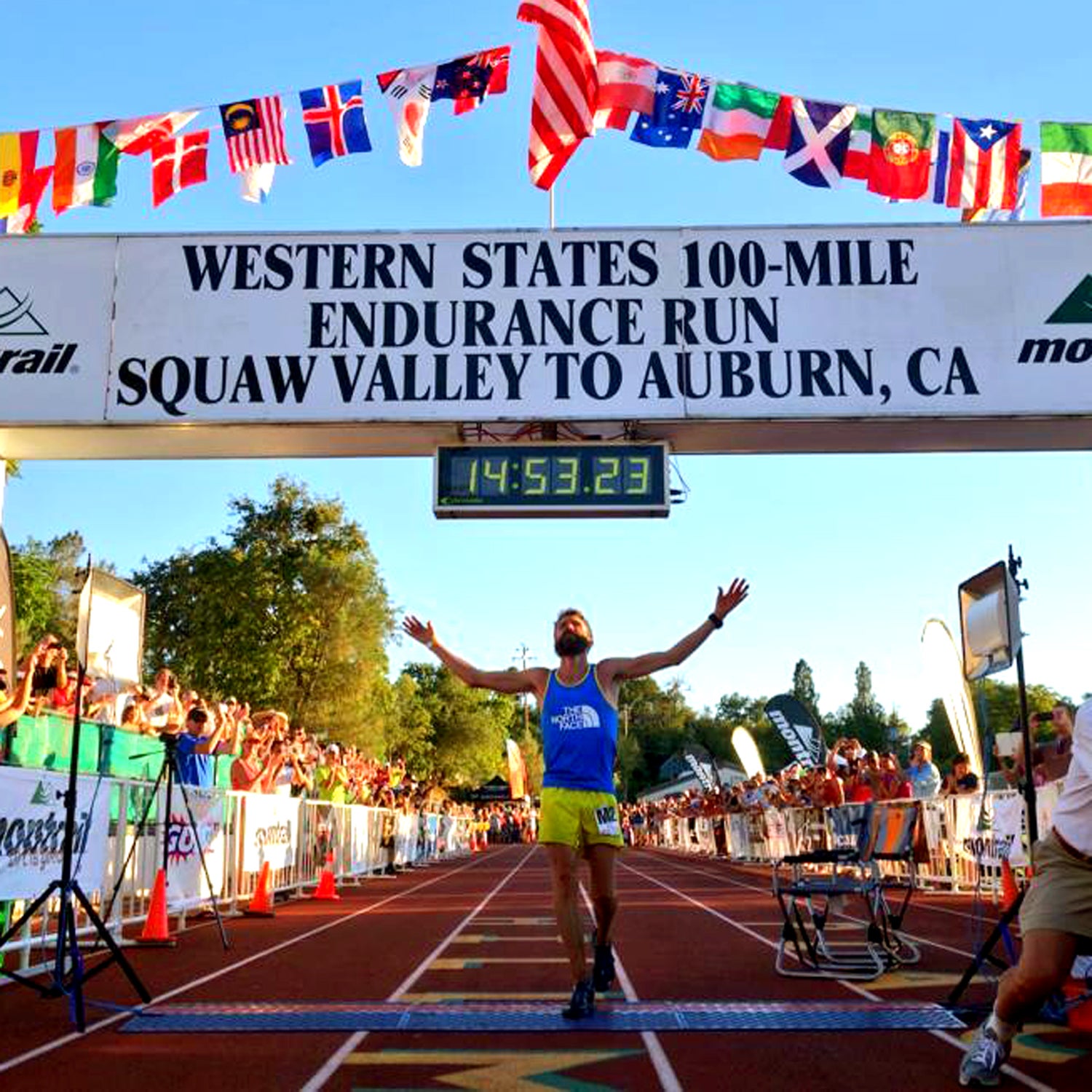The best way to follow runners across the Sierra during the Western States 100-Mile Endurance Run is to . But this year, after a lingering hamstring injury left me unable to race the legendary ultramarathon from Squaw Valley to Auburn, I chose to spectate in person, focusing on how the race unfolded at the front and supporting my Marin, California–based training partners and friends in any way possible.
Runners start at 5 a.m. in the darkness of Squaw Ski Resort: 100 miles—including 18,000 feet of vertical ascent and 22,000 feet of descent—that will test their physical and mental prowess in as few as 15 hours or as many 30.
Far less rigorous, my spectating schedule included following the top 10 men through the aid stations of Michigan Bluff (mile 55.7), Foresthill (mile 62), Green Gate (mile 79.8), and No Hands Bridge (mile 96.8).
Reaching Green Gate required a 1.5-mile hike down a hot and dusty fire road—not exactly a trivial distance when a crew (that has already been operating for 12-plus hours) needs to bring enough ice, food, drink, clothes, and meds for its runner. Crews feel the immense pressure of meeting the runner’s every need in the precious few minutes they interact. Combine that with physical exertion and lack of sleep and crewing Western States might just be more difficult than running it.
The race played out as many expected: The über-talented 100-mile debutant Max King built an early lead. By Foresthill, Rob Krar (second place in 2013) had made up 5 minutes in the previous 6 miles, closing the gap to 90 seconds. Krar eventually passed King, built a lead of nearly 20 minutes, and did not surrender. He went on to win in 14:53, the second-fastest time in race history.
On the women’s side, Stephanie Howe, in her first 100-mile race, had built a 20-minute lead by Foresthill but seemed to be struggling with an altered gait. I thought for sure the relaxed and fluid Larisa Dannis in second would catch up. I was wrong. Howe was having a bad patch, not a bad race, and won in 18:01, the fourth-fastest women’s time in race history. (This is the danger of predicting a 100-miler when you only see snapshots from a few aid stations.)

Throughout the day, I witnessed my friends running smart, patient, beautiful races. Dylan Bowman moved up consistently and ended on the podium in third place, a personal best. Alex Varner, in his debut, finished seventh in just under 16 hours. Brett Rivers executed flawlessly to take 1 hour 20 minutes off his best WS100 time, placing ninth in 16:20 and garnering one of the coveted top-10 spots that guarantee a place in next year’s event.

When it was all said and done, four of the top nine men were runners from the Bay Area who run together several times a week, trading inspiration and advice. Their times are representative of the sport’s growing competitiveness (and the value of talented training partners).
Prior to 2014, only nine times had a runner gone under 16 hours; six of those occurred in the abnormally cold 2012 race. This year, the first eight finishers went sub-16 in warm conditions—the high in Auburn was 89 degrees.

Forty meters past the finish line, the tremendous effort that the top guys put in was apparent. Bowman, covered in blankets, gazed back at the course with a thousand-yard stare, as if he’d left some part of himself back there. King, who ended up fourth, lay on his side and told me never to do this to myself. And Ian Sharman, who was sixth—well, Ian looked okay, which is maybe not surprising from the guy who last year.
The next day, the sub-24-hour finishers and the top 10 were all honored in an awards ceremony. I decided not to attend. After all, I need to save some surprises for next year.
In February, Matthew Laye won the Rocky Raccoon 100 in Huntsville, Texas—his first hundred-miler.


